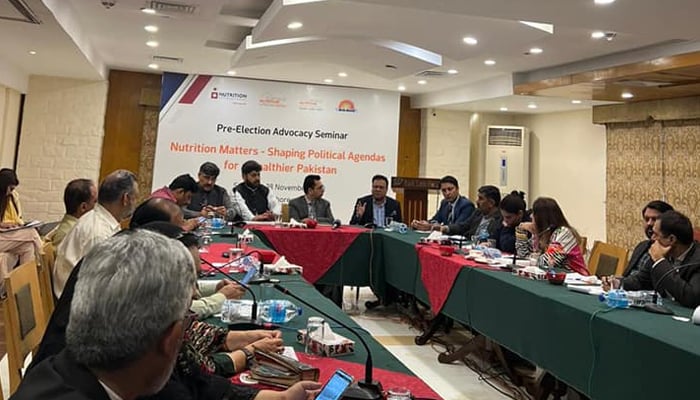Pre-election advocacy seminar: Political parties urged to focus on malnutrition challenges
LAHORE : The Scaling Up Nutrition Civil Society Alliance (SUNCSA) Pakistan and Nutrition International conducted a pre-election advocacy seminar urging the mainstream political parties to take the malnutrition challenges being faced by Pakistan into consideration and its impact on the country’s development.
The seminar proposed viable political solutions that can be integrated into the election manifestos and broader developmental agenda of political parties to improve nutrition status of the people of Pakistan.
Welcoming the participants of the seminar, Deputy Country Director Pakistan, Nutrition International Dr Irfanullah Khan said that nutrition challenges are becoming increasingly important in political discourse in the wake of the upcoming general election. Amid developing political party manifestos and subsequent government policies on the horizon, it becomes imperative to make nutrition a priority agenda for these strategic frameworks, Dr Irfanullah added.
In Pakistan, 40% of children suffer from stunting, 17.7% experience wasting, and 12 million children under 5 are stunted (6% of global cases).
SUN Civil Society Network Chairperson Dr Irshad Danish highlighted that 37% of Pakistan's population faced food insecurity. Additionally, half of pregnant women suffer from anemia. Malnutrition's consequences include hindering physical and mental development, impacting education, productivity and adult income. It costs Pakistan USD 7.6 billion yearly, around 3% of its GDP.
Former MPA of PML-N Saira Iftikhar during her address emphasised that nutrition should be a priority for all political parties. The severity of malnutrition challenges in Pakistan necessitates substantial commitments from every political party. She also stated that the party I am affiliated with is aware of the crucial importance of nutrition, especially for women and children. “I assure you that the nutrition recommendations discussed during the meeting will be integrated into my party's manifesto.” Concluding the event, Mubarak Ali Sarwar, Chairperson of SUNCSA Pakistan highlighted that malnutrition serves as both a cause and consequence of poverty. He emphasised the urgent need for political parties and the government to prioritize and incorporate it into their agendas. Additionally, he expressed concern that the prevalence of malnutrition in Pakistan poses a significant threat to the progress toward achieving the Sustainable Development Goals, notably SDG 2: Zero Hunger.
The political leaders who attended the seminar reaffirmed their dedication to the nutrition agenda. They assured that they would present the nutrition-related recommendations and key actions to their respective party's manifesto committee, aiming to incorporate them into their election manifesto.
Among the key suggestions tabled during the seminar were: recognising food security and nutrition as fundamental rights in Pakistan's constitution; addressing the underlying causes of malnutrition, including poverty, food insecurity, sanitation, and education; and allocating more public funds and investments toward nutrition to effectively tackle the scale of malnutrition.
Other key actions suggested to incorporate in the party's manifesto are enactment/revision and implementation of nutrition related laws including mandatory food fortification law and protection and promotion of breastfeeding law, scaling up essential life-saving preventive and curative nutrition services for vulnerable groups, especially in flood-affected and hard-to-reach areas, strengthening governance and accountability for effective implementation of nutrition programs at all levels.
-
 US To Exit WHO: A Seismic Shift In Global Health?
US To Exit WHO: A Seismic Shift In Global Health? -
 Palace Staff Reveals Nothing Has Changed For ‘disgraced’ Andrew After Losing Titles
Palace Staff Reveals Nothing Has Changed For ‘disgraced’ Andrew After Losing Titles -
 How Did Taylor Swift Cope With ‘exhausting’ Sickness During Popular ‘Eras Tour’
How Did Taylor Swift Cope With ‘exhausting’ Sickness During Popular ‘Eras Tour’ -
 Artists Launch ‘Stealing Isn’t Innovation’ Campaign Against AI Use
Artists Launch ‘Stealing Isn’t Innovation’ Campaign Against AI Use -
 Elon Musk’s XAI Grok Imagine Now Generates 10-second Videos With Sharper Quality: Here’s How
Elon Musk’s XAI Grok Imagine Now Generates 10-second Videos With Sharper Quality: Here’s How -
 Gaten Matarazzo Reveals Having A Gripe About Unfair Treatment On 'Stranger Things'
Gaten Matarazzo Reveals Having A Gripe About Unfair Treatment On 'Stranger Things' -
 Jeff Bezos Vs Elon Musk: Blue Origin Enters Satellite Race To Rival Starlink
Jeff Bezos Vs Elon Musk: Blue Origin Enters Satellite Race To Rival Starlink -
 Charlie Puth Explains Why He Went Against His Own Words About 'Hero'
Charlie Puth Explains Why He Went Against His Own Words About 'Hero' -
 Popular Weight-loss Drugs Could Help Treat Addiction
Popular Weight-loss Drugs Could Help Treat Addiction -
 Brooklyn Beckham In ‘terrible Spot’ Like Prince Harry After Airing Family Drama
Brooklyn Beckham In ‘terrible Spot’ Like Prince Harry After Airing Family Drama -
 A$AP Rocky Reveals Real Reason Behind Feud With Drake
A$AP Rocky Reveals Real Reason Behind Feud With Drake -
 Stroke During Pregnancy Linked To Long-term Heart Problems
Stroke During Pregnancy Linked To Long-term Heart Problems -
 Trump Backs Off European Tariffs Threat After Reaching ‘framework Of A Future Deal’ On Greenland With NATO
Trump Backs Off European Tariffs Threat After Reaching ‘framework Of A Future Deal’ On Greenland With NATO -
 South Korea Passes World’s First Comprehensive AI Law, Reshaping Global Regulation
South Korea Passes World’s First Comprehensive AI Law, Reshaping Global Regulation -
 ‘Disgraced’ Andrew’s New Demands Exposed As He Moves Out Of Royal Lodge
‘Disgraced’ Andrew’s New Demands Exposed As He Moves Out Of Royal Lodge -
 Court Allows TikTok To Operate In Canada Pending Review
Court Allows TikTok To Operate In Canada Pending Review




